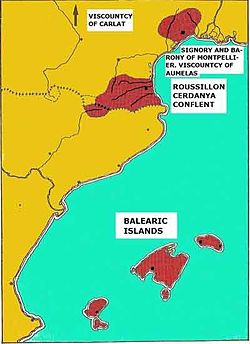Kingdom of Majorca
| Kingdom of Majorca | ||||||||||
|
Regne de Mallorca (Catalan) Reino de Mallorca (Spanish) Regnum Maioricae (Latin) |
||||||||||
|
||||||||||
|
The Kingdom of Majorca.
|
||||||||||
| Capital | Palma and Perpignan | |||||||||
| Religion |
Roman Catholicism Islam Judaism |
|||||||||
| Government | Monarchy | |||||||||
| History | ||||||||||
| • | Established | 1231 | ||||||||
| • | Nueva Planta decrees | 1715 | ||||||||
|
||||||||||
| Today part of |
|
|||||||||
The Kingdom of Majorca (Catalan: Regne de Mallorca, IPA: [ˈreŋnə ðə məˈʎɔrkə]; Spanish: Reino de Mallorca; Latin: Regnum Maioricae) was founded by James I of Aragon, also known as James The Conqueror. After the death of his firstborn son Alfonso, a will was written in 1262 and created the kingdom to cede it to his son James. The disposition was maintained during successive versions of his will and so when James I died in 1276, the Crown of Aragon passed to his eldest son Peter, known as Peter III of Aragon or Peter the Great. The Kingdom of Majorca passed to James, who reigned under the name of James II of Majorca. After 1279, Peter III of Aragon established that the king of Majorca was a vassal to the king of Aragon. The title continued to be employed by the Aragonese and Spanish monarchs until its dissolution by the 1715 Nueva Planta decrees.
The kingdom included the Balearic Islands: Majorca, Minorca (which was still under the rule of Muslims until 1231, when its sovereignty was surrendered to James I), Ibiza and Formentera. The king was also lord of the counties of Roussillon and Cerdanya and the territories James I kept in Occitania, the signory of Montpellier, the viscountcy of Carlat, in Auvergne, and the barony of Aumelas, contiguous to Montpellier.
...
Wikipedia


